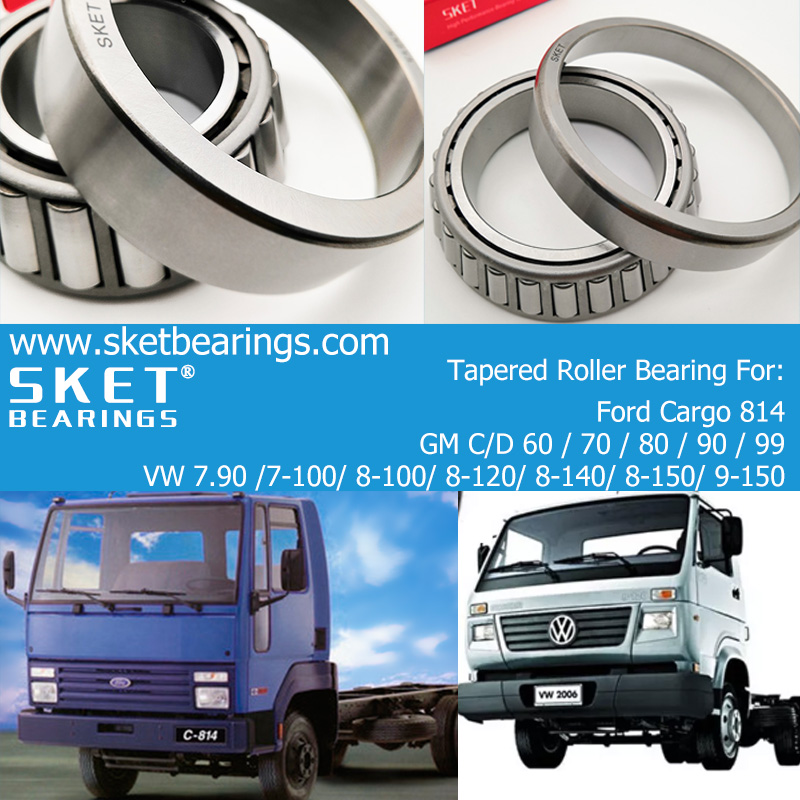Truck wheel hub bearing for Agrale, Chrysler, Ford, GM, VW, Mercedes Benz, Scania, Volvo, Toyota
Truck wheel hub bearing for Agrale, Chrysler, Ford, GM, VW, Mercedes Benz, Scania, Volvo, Toyota
Truck wheel hub tapered roller bearing manufacturer and supplier in China - SKET Bearing Company
SKET is a professional manufacturer and supplier of tapered roller bearings for trucks Agrale, Chrysler, Ford, GM, VW, Mercedes Benz, Scania, Volvo and Toyota in Brazil market.
Item
SKET Model
OE
1
15106/15250X
Ford / GM / VW
2
25590/25522
Ford / GM / VW
3
368A/362A
Ford / GM / VW
4
3782/3720
Ford / VW
5
580/572
VW
6
HM212049/HM212011
Ford / VW
7
594A/592A
Ford / VW
8
2780/2720
Chrysler / Ford / GM
9
39590/39520
Chrysler / Ford / GM / VW
10
3982/3920
Agrale / GM / VW
11
33019
Mercedes Benz
12
LM48548/LM48510
GM / Chrysler
13
594/592A
Ford / VW
14
33215
Mercedes Benz
15
387A/382A
Agrale / GMC / VW
16
3780/3720
Agrale
17
33210
Mercedes Benz
18
33208
GMC / Mercedes Bens / Volvo
19
25877/25821
Ford / GM / VW
20
LM501349/LM501310
Ford / General Motors
21
15101/15245
Ford
22
33015
Mercedes Benz
23
LM102949/LM102910
Ford / Toyota / GM
24
LM11949/LM11910
Ford / GM / Chrysler
25
M12649/M12610
Ford / GM
26
3585/3525
Ford / VW
27
598A/593X
Mercedes Benz
28
HM218248/HM218210
Scania / Volvo
29
32018X
Mercedes Benz
30
LM67048/LM67010
Ford / General Motors
31
33214
Mercedes Benz
32
33895/33822
Mercedes Benz
33
32310
Mercedes Benz
34
32213
Mercedes Benz
35
15103S/15243
General Motors
36
32311
Scania
37
LM11749/LM11710
Ford / VW / GM
38
33114
Mercedes Benz
39
LM104949/LM104911
Ford
40
32308
Scania
41
559/552A
Mercedes Benz
42
683/672
Volvo
43
39585/39520
General Motors

The Ford Cargo is a forward control (cab-over-engine) truck model that is manufactured by Ford.
Ford Cargo (Europe)
Ford Cargo 1830 (Turkey)
With the demise of the Ford Transcontinental heavy truck range in 1983, British Ford introduced a range of heavyweight Cargo tractor units ranging from 28- to 38-tonnes gcw. The 38-tonners were powered by the Cummins L10 while those at 28- and 32-tonnes had Perkins, Cummins, or air-cooled Deutz diesels. The 7.49 tonne Cargos had Dorset and Dover fours or sixes, starting with a 89 bhp (66 kW) unit in the 0809.[3] The Dover six-cylinder engines were mounted at a slant in the Cargo.[4]
In 1986, Ford sold its European truck operations to the Italian Iveco group and subsequent vehicles have been badged Iveco Ford. After the recession in the 1990s, Iveco rationalised its production operations, overlooked by Keith Stanley Jones (Production Engineering Manager). Its Langley plant closed in October 1997, bringing British Iveco/Ford truck production to an end.
The original lightweight Cargo was replaced in 1993 by the Iveco Eurocargo range, covering the 7.5-ton to 18-ton GVW range.
Pre-facelift Ford Cargo in Germany. (North American version is similar)
2012 Ford Cargo 2628
It was originally only built in Ford's Langley (Slough) plant, from which about a third of the production was exported to continental Europe. Cargos were also exported to Turkey and to Australia, while panels were supplied to Brazil for local assembly (these Brazilian trucks were also exported to the United States).[2]
Production has expanded since: the model is still made in Argentina (only the Cargo 1722[5] between 1999 and 2000) and Venezuelan (also known as the Ford Trader) Ford subsidiaries, Turkey's Ford Otosan, and India's Ashok Leyland (as the eComet and as the Stallion).
Ford Cargo (Americas)
In 1986, in the United States, Ford introduced the Cargo as part of its commercial truck range. Intended to replace the long-running C-Series cabover (largely unchanged since 1957) the Cargo was gradually phased in alongside its predecessor, slotted below the larger CL-9000 semitractor. For the first time, a commercial Ford truck sold in the United States was assembled outside of Louisville, Kentucky, with production sourced from Brazil. Following the 1997 sale of the Ford heavy-truck line to Freightliner, production of the Cargo shifted to Freightliner, where it was marketed and sold under the Freightliner FC and Sterling SC brand names through 2007.
In 2006, the Ford LCF was introduced in North America as part of a joint venture with Navistar International. While not a direct successor to the Ford Cargo (designed as a Class 5/6 vehicle; the Cargo was a Class 6/7 truck), the LCF was a low-COE similar in configuration to the Isuzu N-Series, Chevrolet/GMC W-Series, and Mitsubishi Fuso Canter. After a poor market response, the Ford LCF and its International CF/CityStar counterpart were withdrawn after 2009.

 Request for Quotation
Request for Quotation
